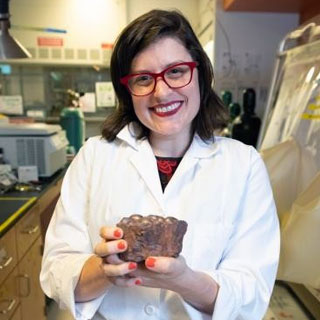***The undergraduate Earth and Atmospheric Sciences (EAS) bachelor’s degree program will end for new entrants after Spring 2025.***
Georgia Tech invites students to consider its expanded undergraduate offerings in Atmospheric and Oceanic Sciences (AOS), Solid Earth and Planetary Sciences (SEP), and Environmental Science (ENVS), an interdisciplinary College of Sciences degree between the School of Earth and Atmospheric Sciences and the School of Biological Sciences.
These programs target a wider range of job and research opportunities — from academia to analytics, NASA to NOAA, meteorology to marine science, climate and Earth science, to policy, law, consulting, sustainability, and beyond.
Undergraduate Earth and Atmospheric Sciences (EAS) Degree Overview
Georgia Tech’s undergraduate EAS degree program uniquely integrates programs in environmental science, meteorology, and solid Earth science. Our program has key benefits:
- Flexible degree options. Customized degrees to fit your specific interests and career goals.
- Rigorous quantitative and computational experience. Preparation for scientific careers in industry and academia.
- Undergraduate internship and research opportunities. A chance to travel the world and earn credits while undertaking projects at prestigious organizations, such as the National Weather Service, CNN, NASA-JPL, and participating in international field research campaigns.
As an EAS major, you will develop basic foundations in Earth, planetary, and atmospheric sciences, and will develop an emphasis in either meteorology, environmental sciences, or Earth sciences.
You will develop a strong understanding of the earth beneath our feet, the planets above us, the oceans that surround us, and the atmospheric processes that affect our weather and climate.
Earth and Atmospheric Sciences Degree Concentrations and Options
Concentrations
Customize your curriculum to match your specific interests and career plans.
The EAS undergraduate bachelor’s degree offers three concentrations:
Options
Increase your competitiveness for jobs and graduate school by adding a designation to your degree.
- Pursue an in-depth, long-term research experience that culminates in an Undergraduate Thesis. Learn more about the Research Option.
- Prepare for a global career. Learn more about the International Plan.
- Build a business perspective into your degree. Learn about the Business Option.
- Get a leg up on becoming a scientist. Learn about our five-year B.S./M.S. Program.
B.S. Earth and Atmospheric Sciences Requirements
The Bachelor’s in Earth and Atmospheric Sciences degree program requirements include general core classes; technical courses that provide a strong background in mathematics; technical electives to explore areas in greater depth; courses involving undergraduate research, and free electives. View suggested eight-semester schedules.
Course Highlights
- Habitable Planet: An introductory course describing planetary formation processes, the development of habitability, and major events through time.
- Meteorological Analysis: Work with industry experts to analyze weather data and create real-time forecasts.
- Environmental Field Methods: Field-based observations with modern tools, techniques, and data analysis, for societal context.
- Energy, Environment, and Society: An interdisciplinary project-based course blending current events, guest speakers, and discussion about 21st century energy issues.
View all of the B.S. in Earth and Atmospheric Sciences requirements and course descriptions.
Rankings and Awards
Georgia Tech’s School of Earth and Atmospheric Sciences faculty members are frequently recognized for their outstanding contributions to their fields. This includes:
- 13 fellowships in national and international professional societies.
- 17 Young Investigator and Early Career Awards.
- 46 awards from professional societies and national or international agencies.
See the full list of research awards.
What Can I Do With a Degree in Earth and Atmospheric Sciences?
The undergraduate EAS program prepares students for graduate study or immediate employment in fields such as:
- Air Quality.
- Climate Science.
- Environmental Chemistry.
- Environmental Impact Assessment.
- Exploration Geophysics.
- Geologic Hazards.
- Meteorology.
- Oceanography.
- Planetary Science.
What Are Georgia Tech Graduates Doing Now?
- Environmental Scientist.
- Air Quality and Climate Change Planner.
- Assistant Professor.
- Broadcast Meteorologist.
- Geophysicist.
- High School Science Teacher.
- International Environmental Protection Specialist.
- Research Technologist.
- Water Resource Specialist.
Meet School of Earth and Atmospheric Sciences alumni.
Earth and Atmospheric Sciences Research Opportunities
Participating in research is a very exciting part of your undergraduate experience and is highly encouraged.
- How to get involved in undergraduate EAS research.
- Research for credit or pay.
- Bachelor of Science with Research Option.
Beyond the Classroom
- Get involved! As an EAS student, you may be interested in joining the Association of Environmental Engineers and Scientists, Students Organizing for Sustainability, Sigma-Gamma-Epsilon, or STORM (STudents Observing and Researching Meteorology).
- Get a leg up and learn about undergraduate research opportunities in your first year. Apply to reside in the Science and Mathematics Research Training Living Learning Community.
- Gain employment experience and benefit from real-world experience in your field. Learn more about the Co-op Program and the Internship Program.
- Learn more about study abroad opportunities led by College of Sciences faculty.
- Check out our EAS Facebook Page!
Stories From the School of Earth and Atmospheric Sciences

Making Connections and Finding Opportunities

Bridging the Divide Between Public Administration and the Environment

Undergraduate Researcher of Landscape and Early Life Evolution

Laughing Gas May Have Helped Warm Early Earth and Given Breath to Life
Related Degrees
- B.S./M.S. in Earth and Atmospheric Sciences.
- Minor in Earth and Atmospheric Sciences.
- B.S. in Atmospheric and Oceanic Sciences.
- B.S. in Solid Earth and Planetary Sciences.
- B.S. in Environmental Science.
Related Websites
Next Steps
(text and background only visible when logged in)